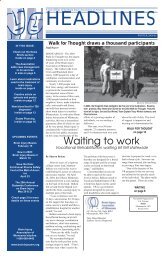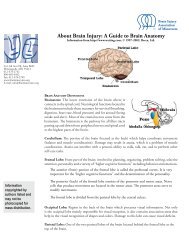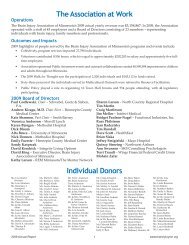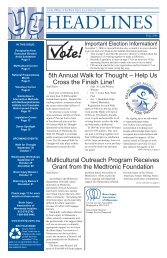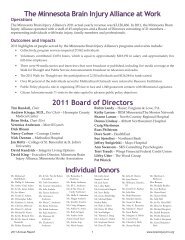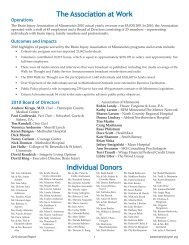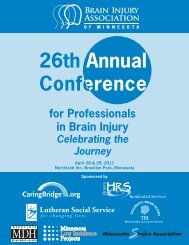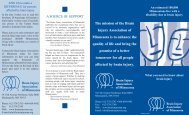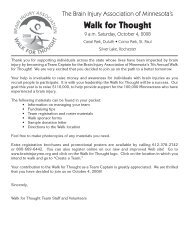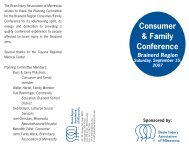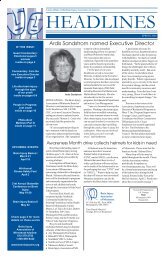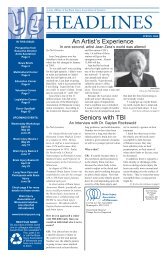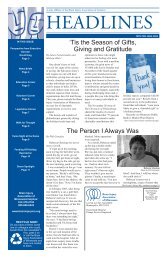routine building strategies - Minnesota Brain Injury Alliance
routine building strategies - Minnesota Brain Injury Alliance
routine building strategies - Minnesota Brain Injury Alliance
You also want an ePaper? Increase the reach of your titles
YUMPU automatically turns print PDFs into web optimized ePapers that Google loves.
Information copyrighted by authors listed and<br />
may not be photocopied for mass distribution.<br />
5/2011<br />
ROUTINE BUILDING STRATEGIES:<br />
PROMOTING SKILLS FOR ORGANIZATION AND<br />
INDEPENDENCE<br />
By The <strong>Minnesota</strong> <strong>Brain</strong> <strong>Injury</strong> <strong>Alliance</strong> Program Staff<br />
Why Build Routines?<br />
Structure and <strong>routine</strong> are the keys to independent functioning and success. <strong>Brain</strong> injury is an<br />
unplanned event. It disrupts life as we know it. Unpredictably becomes part of everyday experiences.<br />
No one can predict how much someone will recover from brain injury. No matter what type of brain<br />
injury one has, creating a daily <strong>routine</strong> adds stability for the person with the injury and everyone else<br />
who is involved in their life.<br />
Developing a <strong>routine</strong> and a memory system is not as easy or as boring as it sounds. It takes planning,<br />
time, consistency, determination and support. A person with a brain injury who is currently<br />
hospitalized may not have the ability to keep their own <strong>routine</strong>. A young child with a brain injury<br />
may be too disorganized or lack understanding and time management. A teenager or adult may see it<br />
as “boring” or intrusive to their ideal of freedom. No matter how little or how much this brain injury<br />
affects you or your loved one, having a <strong>routine</strong> and structure will increase independence.<br />
How to Get Started:<br />
General <strong>strategies</strong> and principles for becoming more organized can be applied to anyone. Tools for<br />
becoming more organized are individual and need to be personalized according to a person’s abilities. It<br />
is not uncommon that the tools in a person’s “kit” will change as he or she becomes better at following<br />
a <strong>routine</strong>. There will be days that tools need to be relied on heavily and other days where life is smooth<br />
sailing. That is typical of how brain injury affects people.<br />
Essential Tools:<br />
• Be willing to try; practice is essential.<br />
• Be willing to accept help and feedback from others.<br />
• Be willing to forgive mistakes.<br />
• Understand that <strong>building</strong> a <strong>routine</strong> takes a commitment of time, discipline and support.<br />
• Understand that the <strong>strategies</strong> a person uses may need to change sometimes.<br />
• Be assertive. Let people know that a <strong>routine</strong> is important and advance notice of changing plans<br />
is necessary.
Information copyrighted by authors listed and<br />
may not be photocopied for mass distribution.<br />
Getting Started: Helpful Hints for Adults and Teenagers:<br />
• Use a personal organizer or three-ring notebook – and take it everywhere.<br />
• If the person used an assistive technology device like a smart phone in the past try using this<br />
again if their vision and fine motor abilities permit.<br />
• Obtain assistance from a Speech Language Pathologist or Occupational Therapist when able.<br />
• Make sure the tools that the person uses are portable.<br />
• A large family or group calendar posted in a prominent place can remind family and<br />
other supportive people about their responsibilities and gives a consistent place to retrieve<br />
information.<br />
• Create a centralized message center for placing and obtaining phone messages and other<br />
priority information.<br />
• A neuropsychological assessment will describe the individual’s needs for planning and<br />
organizing abilities.<br />
Getting Started: Helpful Hints for Adults Helping Children:<br />
• Colored folders and pictures may be used by children or when reading ability is affected.<br />
• Obtain assistance from a Speech Language Pathologist or Occupational Therapist when able.<br />
• Make sure the child uses something portable and brings it from school to home daily.<br />
• Create a consistent storage place for their stuff including, planner, backpack, shoes, keys etc.<br />
• Take time daily to review schedule, activities, chores, hygiene etc.<br />
• Teach, encourage and gently orient the child to time. Time management is a common<br />
difficulty.<br />
• Give the child control over planning times to complete tasks where practical. This may help<br />
with power struggles and teach assertiveness and decision making.<br />
For the Spouse, Helper, Parent, Friend or Loved One:<br />
• If a brain injury drastically affects a person’s ability to initiate activities, lots of help and cueing<br />
may be needed.<br />
• If taking meaningful notes is too difficult, an individual will need ongoing one-on-one support<br />
to use a memory system.<br />
• A person needs to feel that his or her memory system and <strong>routine</strong>s are meaningful.<br />
• It may take some time for a person to become self-motivated and accustomed to planning and<br />
using a memory system.<br />
• A person who has cognitive changes from brain injury may need ongoing support,<br />
encouragement and reinforcement to use a memory system.<br />
• If a person has felt discouraged by past attempts to use a memory system he or she will need<br />
lots of encouragement to keep trying.
Information copyrighted by authors listed and<br />
may not be photocopied for mass distribution.<br />
General Strategies for Everyone:<br />
• Keep mealtimes, bed times and waking hours as consistent as possible.<br />
• Become aware of your body’s signals and signs of stress.<br />
• Work on developing good coping <strong>strategies</strong>.<br />
• Develop a support system.<br />
• Schedule time for exercise and fun.<br />
• Remember to laugh at yourselves sometimes.<br />
Planning & Scheduling Strategies:<br />
• Set aside quiet time everyday for scheduling tasks and priorities.<br />
• Make lists of enjoyable activities and try to incorporate them into <strong>routine</strong>s and longer range<br />
plans.<br />
• Write down daily activities. Check off accomplished tasks.<br />
• Spend time moving tasks that were not accomplished today to become priority items on an<br />
upcoming day.<br />
• Check the family or group calendar daily and to recall additional time commitments and make<br />
sure the calendar agrees with individual planners.<br />
Communication Strategies to Enhance Abilities:<br />
• Work in a quiet environment free from background noise.<br />
• Ask people to repeat key information.<br />
• Establish eye contact.<br />
• Relay important information and learn/teach new skills during times of the day when fatigue is<br />
not an issue.<br />
• Use step-by-step instructions written in a clear manner.<br />
Setting up the environment:<br />
Tip: Staying organized may be an ongoing challenge for a person who has sustained a brain injury.<br />
Take time to reorganize.<br />
• Establish a storage center for important items like purses, wallets, backpacks, planners, keys,<br />
and sunglasses. Always store things in that place as soon as you walk in the door.<br />
• Buy household appliances with automatic shutoffs.<br />
• Post all important telephone numbers in a visible area.<br />
• Keep a pad of paper and pen by every phone.<br />
• Establish a message center. Use post-it notes that can be stored on a bulletin board and<br />
attached to a person’s planner.<br />
• Put reminder post-it notes in logical places to help a person remember. For example, put<br />
“FLOSS YOUR TEETH” on the bathroom mirror or “REMEMBER YOUR LUNCH” by the<br />
main door.
Information copyrighted by authors listed and<br />
may not be photocopied for mass distribution.<br />
It is never too late to start using a system! Keep looking for ways to work efficiently. Keep a sense of humor<br />
and remember that having structure in your life is the key to independent functioning.<br />
References:<br />
• Claire T. Courtney. Memory Notebooks.<br />
• Pam Dougherty and Mary Radomski. The Cognitive Rehabilitation Notebook. Aspen Publishers<br />
• Heike Kessler-Heiberg, MA-CCC. Structure, Structure Everywhere.



